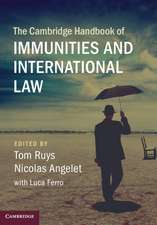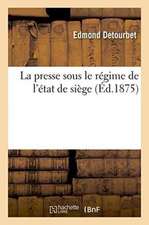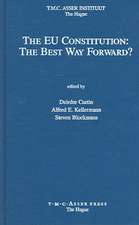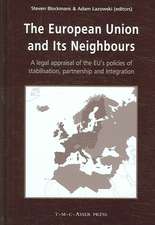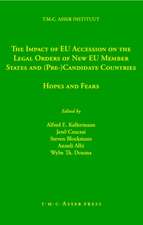The European Union and Peacebuilding: Policy and Legal Aspects
Editat de Steven Blockmans, Jan Wouters, Tom Ruysen Limba Engleză Hardback – 30 iun 2010
Like conflict prevention and crisis management, ‘peacebuilding' forms an integral part of the European Union's external policy efforts to break the cycle of conflict, insecurity and poverty. A concept developed in the context of the United Nations, the EU's Lisbon Treaty mentions ‘post-conflict stabilisation' among the tasks which the EU is set to perform in the implementation of the Common Security and Defence Policy.
The Union's advance in this field has been universally welcomed by peacebuilding actors, especially since the EU's ongoing contributions in financial, technical and logistical terms in post-conflict areas have been couched in an increasing number of European Security and Defence Policy missions. The proliferation of the EU's institutional and operational mechanisms to build peace in post-conflict environments has led to a whole series of new policy and legal questions, which are addressed by leading practitioners and academics in this unique compilation.
Specific to this book:
•Contributions take into account the final text of the Lisbon Treaty and the lessons learned from more than twenty military and civilian operations
•Addresses policy and legal potential and limits, and outlines the parameters for future decision-making and capacity-building
•Combines thematic contributions with concrete case studies, and offers insights into how the EU’s peacebuilding tools are implemented in practice
Preț: 661.32 lei
Preț vechi: 778.03 lei
-15% Nou
Puncte Express: 992
Preț estimativ în valută:
126.54€ • 132.12$ • 104.73£
126.54€ • 132.12$ • 104.73£
Carte tipărită la comandă
Livrare economică 04-18 aprilie
Preluare comenzi: 021 569.72.76
Specificații
ISBN-13: 9789067043298
ISBN-10: 906704329X
Pagini: 544
Ilustrații: 540 p.
Greutate: 1 kg
Ediția:1st Edition.
Editura: T.M.C. Asser Press
Colecția T.M.C. Asser Press
Locul publicării:The Hague, Germany
ISBN-10: 906704329X
Pagini: 544
Ilustrații: 540 p.
Greutate: 1 kg
Ediția:1st Edition.
Editura: T.M.C. Asser Press
Colecția T.M.C. Asser Press
Locul publicării:The Hague, Germany
Public țintă
ResearchCuprins
Making Peace Last. The EU’s Contribution to Peacebuilding.- Making Peace Last. The EU’s Contribution to Peacebuilding.- EU peacebuilding — general perspectives.- EU Peacebuilding: Concepts, Players and Instruments.- The EU As Peacebuilder: Actorness, Potential and Limits.- EU Enlargement As a Peacebuilding Tool.- Working with partners.- EU-UN Cooperation in Peacebuilding: Natural Partners?.- The EU and The UN Peacebuilding Commission: A Short Account of How the EU Presence Has Influenced the Newest UN Body.- Cooperation between the EU and the AU in the Field of Peacebuilding.- Convergence without Cooperation? The EU and OSCE in the Field of Peacebuilding.- Peace and security.- The European Union and Security Sector Governance.- Strengthening Security, Building Peace: The EU in the Democratic Republic of Congo.- The European Union and Peacebuilding: The Case of Chad.- EU Peacebuilding in Georgia: Limits and Achievements.- The EU in Afghanistan: Peacebuilding in a Conflict Setting.- Ruleof law, democracy and human rights.- The European Union and Electoral Support.- Mainstreaming Human Rights and Gender into The Common Security and Defence Policy: The Case of The EU Monitoring Mission in Georgia.- Eulex Kosovo: Walking a Thin Line, Aiming for the Rule of Law.- The Aceh Monitoring Mission: Securing Peace and Democracy.- The European Union and Transitional Justice.- Good governance and economic development.- International Trusteeship and Democratic Peacebuilding: The EU in the Balkans.- A Missed Opportunity: State Building in Bosnia and Herzegovina (October 2002 to October 2006).- Meeting the Challenge of State Building: EU Development Policy and Cooperation in Postconflict Countries.- The EU and The Kimberley Process: A New International Actor for New International Relations.
Textul de pe ultima copertă
With a Foreword by Catherine Ashton, High Representative of the Union for Foreign Affairs and Security Policy/Vice-President of the European Commission
Like conflict prevention and crisis management, ‘peacebuilding' forms an integral part of the European Union's external policy efforts to break the cycle of conflict, insecurity and poverty. A concept developed in the context of the United Nations, the EU's Lisbon Treaty mentions ‘post-conflict stabilisation' among the tasks which the EU is set to perform in the implementation of the Common Security and Defence Policy.
The Union's advance in this field has been universally welcomed by peacebuilding actors, especially since the EU's ongoing contributions in financial, technical and logistical terms in post-conflict areas have been couched in an increasing number of European Security and Defence Policy missions. The proliferation of the EU's institutional and operational mechanisms to build peace in post-conflict environments has led to a whole series of new policy and legal questions, which are addressed by leading practitioners and academics in this unique compilation.
Specific to this book:
•Contributions take into account the final text of the Lisbon Treaty and the lessons learned from more than twenty military and civilian operations
•Addresses policy and legal potential and limits, and outlines the parameters for future decision-making and capacity-building
•Combines thematic contributions with concrete case studies, and offers insights into how the EU’s peacebuilding tools are implemented in practice
Like conflict prevention and crisis management, ‘peacebuilding' forms an integral part of the European Union's external policy efforts to break the cycle of conflict, insecurity and poverty. A concept developed in the context of the United Nations, the EU's Lisbon Treaty mentions ‘post-conflict stabilisation' among the tasks which the EU is set to perform in the implementation of the Common Security and Defence Policy.
The Union's advance in this field has been universally welcomed by peacebuilding actors, especially since the EU's ongoing contributions in financial, technical and logistical terms in post-conflict areas have been couched in an increasing number of European Security and Defence Policy missions. The proliferation of the EU's institutional and operational mechanisms to build peace in post-conflict environments has led to a whole series of new policy and legal questions, which are addressed by leading practitioners and academics in this unique compilation.
Specific to this book:
•Contributions take into account the final text of the Lisbon Treaty and the lessons learned from more than twenty military and civilian operations
•Addresses policy and legal potential and limits, and outlines the parameters for future decision-making and capacity-building
•Combines thematic contributions with concrete case studies, and offers insights into how the EU’s peacebuilding tools are implemented in practice




